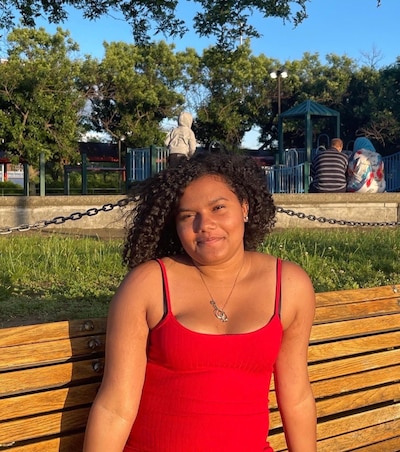After we moved to the Bronx from the Dominican Republic when I was 4, my mom, a home health care aide, worked long shifts and sometimes overnight. When she was at work, my friend’s mom babysat me.
I spent most afternoons and some nights in their apartment, where my friend had the pinkest room I had ever seen. It was something I thought was only possible in movies. There was a giant Barbie house and a toy chest overflowing with board games and stuffed animals. Sometimes, I thought, why can’t I live like this — in a home with cable TV and a PlayStation, with presents under the tree at Christmas?

For most of my life, my mom and I lived in a studio apartment. There was a room divider separating the bed from the small kitchen, and there was a broken clock on the wall. I didn’t have toys like the ones I played with at my friend’s house. But I had a phone to communicate with my mom. On it, I could watch YouTube videos of other people playing games like Minecraft and Call of Duty. When I was at my babysitter’s home, I could play those games, too.
Our studio was a place to sleep, and I’m grateful for it, but it never felt like “home.”
So even when I was old enough to come back alone, I would spend days at a time at friends’ places. But I was constantly making excuses for why they couldn’t come to mine. I’d tell them my mom was cleaning the house or didn’t want guests — not because it was true, but because I was scared that my friends would judge me if they stepped even one foot inside. They probably would think it was weird that our whole apartment could fit in their living room.
I didn’t want people to know how much we struggled. When my friends went out for pizza, sometimes I’d only have a slice and no drink. Sometimes, I’d just tell them I wasn’t hungry, even if I was. Sometimes, I would ask the guy at the corner store near my school if I could pay him later. He’d known me since I was little and trusted that I’d give him the money when I had it.
I share this because it feels good to admit the things I have always been afraid to tell others. Maybe kids whose families struggle — or just don’t have as much as their friends do — will feel less alone. Maybe they will feel proud of the sacrifices their immigrant parents have made.
My mom has always been as generous as she could be. When she has an extra $5 or $10, she gives it to me so I can go out with my friends. After she pays the bills, she prioritizes things I need or that will make my life easier. If she sees a nice coat and she knows I need it, she’ll buy it for me instead of getting something for herself. During remote learning, she bought me a laptop. She really couldn’t afford it, but it was important to her that I stay on top of my schoolwork.
That hasn’t always been easy. I did my homework on the bed, since there was no desk or dining table, and tried hard to concentrate even as my mom talked on the phone on the other side of the room divider. We didn’t have WiFi, so if I needed internet, I’d have to go to my neighbor’s place or stand outside of it so their WiFi could reach my device. If I needed privacy to FaceTime with friends, the only option was to close myself in the bathroom.
Growing up, I knew it was important to my mom that I do well in school. She didn’t pressure me or scold me when I fell short. It didn’t matter though; I put plenty of pressure on myself. If I got an 80 on a test, I’d come home crying — having convinced myself that if I made one mistake my whole life would be ruined. I worried that all my mom’s sacrifices would be for nothing.
Sometimes, I’ve wondered why she came to the U.S. in the first place. In some ways, life in the Dominican Republic seemed more comfortable. My dad lives there and has a two-bedroom apartment to himself. But my mom saw a better future for me in the U.S., even if it meant working long hours and living in a studio apartment with little privacy and a broken clock. The schools here are much better, she told me. She wants me to go to college and become a professional. She wants me to have nice things and not be scared all the time.
That is my dream, too. I don’t want to worry about how I’m going to be able to pay the rent or take a day off if I’m sick. I want to finally take a vacation. I want to learn the budgeting and investing skills that generations before me never had a chance to learn. I want my mom to feel a sense of relief. I want my own kids to have a painted room and a toy chest. I want us to feel what it’s like to breathe, instead of fighting for the air we need.
That future feels closer than ever, now, as I prepare to graduate high school and begin college.
Ashally De La Cruz is a senior at Central Park East High School in New York City. She is in the process of applying to colleges.


